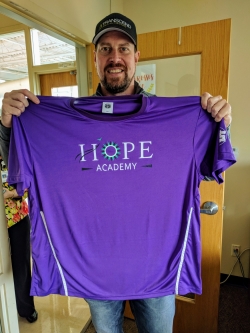 Former National Football League quarterback Ryan Leaf recently spent time with students and staff at Hope Academy after giving the keynote speech at the Fairbanks Circle of Hope Dinner.
Former National Football League quarterback Ryan Leaf recently spent time with students and staff at Hope Academy after giving the keynote speech at the Fairbanks Circle of Hope Dinner.
Leaf was drafted second overall in the 1998 draft, but only played sporadically over six seasons and is now considered one of the biggest busts in league history.
He didn’t take his professional downfall well. Leaf turned to pills to cope with the constant public criticism, and spent the first eight years after leaving football in an endless cycle of crippling self-medication. Eventually he was arrested twice just days apart and served 32 months in prison.
Leaf began volunteering while behind bars, including as an assistant to a substance abuse counselor. Upon his release in 2014, he started working for Transcend Recovery Community in Los Angeles and now serves as the organization’s program ambassador.
Leaf answered questions from Hope Academy students during his visit, and offered insights from his own journey of recovery.
Many students expressed fears about their futures. Leaf reminded the gathering that change is constant and inevitable.
“The question to ask yourself is are you changing for the better?” he said. “A fear of the unknown is something that’s always scared me because it’s something I can’t control. But you always have the power to choose a healthy, positive outlook on something.”
Leaf said he’s been asked often what he thinks his life will look like in five years, especially considering how much it’s changed just in the 3 and a half years since he was released from prison. His answer: I don’t know.
“I may be back in prison,” Leaf said. “If I do today what I did yesterday, I most likely will be peaceful and sober. That’s good enough.”
He admitted upon getting sober that the idea of never taking another drink scared him. But if you take it one day at a time, one day becomes two, then another, and so on. Before long it had been a year for him, and Leaf reflected on how good that year was.
“At your age you think you’re going to miss out on so much,” he told the students. “I lived that portion of life when you’re going to clubs and parties and being messed up and making a fool of yourself. There isn’t anything from that time in my life where I can say to you now, ‘That was awesome.’”
Leaf considers his daily life now to be a maintenance plan. Even though he’s celebrating over six years of sobriety, he still regularly meditates, prays, attends meetings and sees a therapist every other week.
“If I stop anything like that, I’ll revert to old behavior,” he said.
Abusing substances was Leaf’s way of dealing with life after football, something he had wanted to do since the age of 4. Not having a Plan B – and failing very publicly – made his transition especially difficult.
“It was my way of not wanting to feel anything,” Leaf said of his substance abuse. “I think there’s always a why for why we do anything. The more self-awareness you can develop, especially at a younger age, the better off you’ll be in understanding why you do certain things.”
